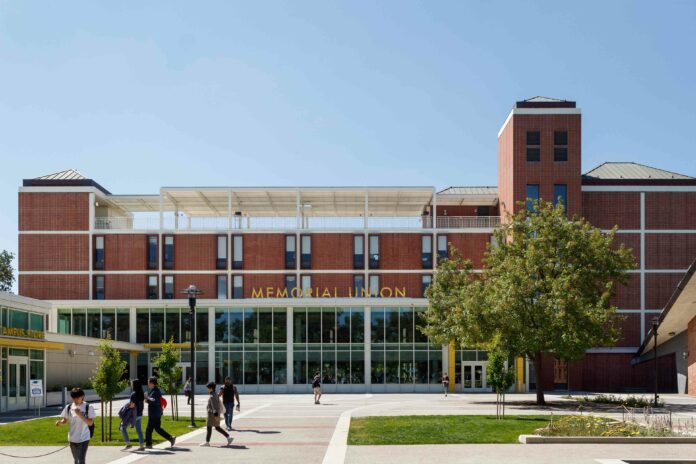Potential student base fee increase in the works to tackle $545,000 budget deficit
Over the past few years, ASUCD has accumulated a budget deficit of about $545,000. The deficit was exacerbated by income losses from the Camp Fire, policy decisions made by past Senate tables and executive officers, new fees imposed by the university and a statewide mandate to increase the minimum wage and stipend positions.
Labor costs funded by ASUCD increased by about $200,000 due to a California-mandated yearly dollar increase to all minimum wage workers as well as an increase for positions with stipends.
According to a 2015 bylaw passed by the ASUCD Senate, stipend positions will increase by 12.5% every year going forward for the next 10 years, a stressor adding to the deficit.
This current Senate table and executive board were forced to address the growing deficit following the Camp Fire in Northern California that impacted UC Davis during Fall Quarter 2018. While the school was closed in response to poor air quality, ASUCD employees were still required to be paid, despite the units not generating any new income. The brief university closure further contributed to the current deficit, which grew by around $200,000.
Senator Maya Barak, a third-year international relations major, spoke more about the drastic deficit increase from the fires.
“Because we took on a large amount of debt just from about a week, it opened all our eyes to just put a stop to an issue that’s getting skirted around for a long time,” Barak said.
ASUCD’s compliance with the university’s Department of Environmental Health and Safety to cover the costs of food-related health inspections for the upcoming fiscal school year added $30,000 to the deficit.
While a large percentage resulted from unavoidable costs, like the minimum wage increases, the deficit has been accumulating over years of neglect.
Noam Marcus, a third-year managerial economics major, served as Interim Business and Finance Chair during Spring Quarter. Before his appointment, Marcus has served on the Business and Finance commission since his second year.
“It is no secret that associations of the past have essentially pushed this deficit on the next term’s board year after year, and this is essentially why it has gotten so bad,” Marcus said. “Senators and executive boards would basically just kick the can down the road assuming future boards would deal with the issue.”
Two ASUCD units, the Experimental College and Student Transportation Services/Tipsy Taxi, were recently dissolved as a result of the budget deficit.
STS/Tipsy Taxi was allotted $88,996 to fund operations for the 2018-2019 school year and generated a projected income of $91,650, according to the ASUCD Budget website. Despite recent improvements made to the unit, senators judged it too costly to continue funding in light of the deficit.
Students currently employed by Tipsy Taxi were offered positions by Unitrans. Previous STS/Tipsy Taxi student employees declined to comment on the unit’s dissolution.
ASUCD Controller Kevin Rotenkolber spoke more about the current Senate’s goal to minimize the number of student jobs lost as a result of unit cuts.
“In addition to other cuts — despite cutting more than 2.5 times more than ever needed before — we only needed to cut five total jobs: three paid positions that Aggie Reuse voluntarily gave up and made volunteer positions and the two paid positions at the Experimental College,” Rotenkolber said.
Because budget changes will not go into effect until July, current employees of the Experimental College will complete their term of employment, effectively bringing the number of student jobs lost down to three.
Going forward, Rotenkolber sees more changes that need to be made to not only address the current deficit, but in order to also address the root cause of the issue.
“The only realistic option to save ASUCD as a whole is to pass the base fee increase,” Rotenkolber said. “In the absence of this base fee increase in the next three years, ASUCD will either financially collapse or be absorbed by the university unless […] another form of drastic financial change occurs. From the conversations I have had with other members of student government, we are all aware of the gravity of our financial situation longterm and the importance of passing this base fee increase in Winter Quarter 2020.”
The current base fee was established in 1979, when it was set at $8 per quarter, according to Rotenkolber. Since then, there have been no adjustments to the fee, including adjusting for inflation, which is why some in the association think it is time for a change.
“We have yet to calculate an exact number [for the fee increase],” Rotenkolber said via email. “But very preliminary estimates are between $20 to $30, but again these are just estimates because 25% will immediately go to scholarships, and a certain percentage will go to our net, capital, and tech reserves.”
Written by: Ally Russell — campus@theaggie.org
Editor’s note: A previous version of this article stated that a bylaw passed by the ASUCD Senate was new, when it was actually from 2015. It also stated that the current base fee was established in 1960, when it was actually established in 1979. STS/Tipsy Taxi was said to have generated an income of $91,650, although this was a projected, not an actual, income. The article has been updated to reflect these changes. The Aggie regrets the error.









“The deficit was exacerbated by income losses from the Camp Fire, policy decisions made by past Senate tables and executive officers, new fees imposed by the university and a statewide mandate to increase the minimum wage and stipend positions.”
This is the most California thing I have ever read.